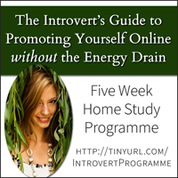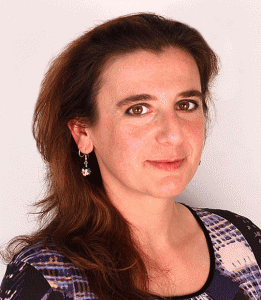A Shared Wisdom Guest Post Featuring Tanja Gardner
Once upon a time, I didn’t realise I was introverted. It was weird. I knew I had THE highest alone-time needs of any human being I’d ever met. I knew I quickly got “peopled out” if I was around groups for too long. I knew that if I had to network in person, I’d sometimes end up having borderline panic attacks.
At that point, the only words I had to describe myself were “anti-social” or “shy.” And yet, neither of those really fitted.
I loved spending some time with friends and family – at least one-to-one or in very small groups. So I wasn’t anti-social. And given that I was happy to step up on a stage and speak (or occasionally, sing) to rooms full of 50, 100, even 200 people? I was pretty sure “shy” wasn’t right either. So I kept bumbling along, not really knowing what was going on with my brain.
Then, late last year, I discovered the concept of introversion. And that discovery changed my freaking life.
When I say it was life-changing, I’m not exaggerating.
If you haven’t heard the term “introversion” before, let me give you a drive-by intro.
Personality experts say that people differ in how their energy levels respond to interacting with others. Some of us (the extroverts) get a buzz from interactions, and start to wilt when they have to spend too much time alone. Others (introverts like me) are exactly the opposite. We recharge during reflection and alone-time, and have to “spend” energy when we interact – even if we enjoy being with people.
None of us are 100% introverted or extroverted: instead, the terms describe opposite ends of an imaginary scale. In practice, we all fall somewhere on that scale. The words “introvert” or “extrovert” just describe how our energy levels tend to respond.
Knowing this suddenly explained SO MANY baffling things in my life. I understood why I react to groups the way I do. I understood why I so often just wanted to shut myself in my room, or take off for a four-hour walk alone.
I wasn’t weird. I wasn’t broken. I didn’t need to “care more about others” or “learn to be more confident.” I was an introvert. I don’t often talk about having epiphanies. But this, my friends, definitely counted!
One thing I quickly discovered: introversion had a huge effect on how I did self-care.
There are all kinds of ways to “do” self-care. Some of them – meditation, journaling, bubble baths – involve spending time alone. Others – getting a massage, going to a yoga class, or seeing a movie with a friend – are more extroverted.
Because I’m such a raging introvert, I often find that the extroverted self-care activities – while they may be fun – don’t recharge me. I enjoy them, sure. But they rarely give me the deep sense of replenishment and renewal that, say, picking up my journal and writing my heart out for an hour does. So when I need a little more self-care in my life, my journal is often my first port of call.
Now, there’s no one right way to be introverted – and there’s no one right way to “do” self-care either. So what works perfectly for me might not be quite so great for you.
But if, like me, you’re an introvert, and you’re finding that your self-care activities just aren’t working for you? Perhaps they’ve become “should do”s that just sit on your To-Do list making you feel guilty? Maybe they’ve even started to stress you out?
In any of these cases, it might help to look at whether or not the activities you’ve chosen are honouring your nature as an introvert.
Plus? I’ve discovered three definite self-care watch-outs.
As I’ve researched the topic of introversion (and mindfully observed myself), I’ve noticed three self-care “watch-outs” that keep coming up. In my Promotion for Introverts programme, I call them the “Top three energy sinks.” They are:
- Overscheduling: trying to stuff yet more into an already overfull calendar is a recipe for exhaustion for anyone. As an introvert, it’s even worse for me, because it doesn’t leave me the alone-time I need between commitments to recharge and renew myself.To avoid overscheduling, I try to figure out what’s most important and focus on that. I also make sure I actively block in downtime for myself in between appointments.
- Not giving myself enough alone time: it’s also not enough for me to simply schedule downtime. I need to spend at least some of that downtime completely alone.I’ve discovered that, for me, “being alone” means not having anyone else in my sensory space. That’s where shutting myself in my room or going for a long walk comes in.
- Comparing myself to extroverts: because I live in an extroverted world, it’s all-too-easy to assume that responding like an extrovert is just “normal.” So when I didn’t react like my extroverted friends in social situations, it used to be hard not to see myself as fundamentally flawed.Reading and learning more about introversion (these are three of my favourite books) has really helped with this. So has connecting with other introverts, and finding introvert-focussed training programmes.
Realising that I’m an introvert, and keeping a careful eye on these watch-outs has made a huge difference in my life.
It’s helped me to figure out what’s going on with my energy levels, and what to do when I start noticing that I’m getting depleted. Even better, it’s helped me understand why I respond so differently in social situations compared to my extroverted friends – and that neither response is “right.”
And of course, it’s helped me to understand exactly what I need from my self-care activities too.
OK, those are my thoughts – now over to you!
I’ve shared my own discoveries and realizations about introversion and self-care with you in this post. Now I’d love to hear your thoughts. If you’re willing, please let me know in the comments:
- Do you see yourself mostly as an extrovert, an introvert, or a mix of the two?
- Which self-care practices really work for you? Which ones have no effect, or even cause you extra stress?
- Do you ever notice yourself doing any of the self-care watch-outs I’ve mentioned above? If so, how do you avoid or manage them when you notice?
***
 Tanja Gardner is a professional copywriter, word weaver and story sculptor at Crystal Clarity Copywriting Ltd. She helps introverted difference-makers like you write with concise, creative clarity that your readers intuitively “get.” That means they understand EXACTLY what you offer – so you can make more of a difference in their lives.
Tanja Gardner is a professional copywriter, word weaver and story sculptor at Crystal Clarity Copywriting Ltd. She helps introverted difference-makers like you write with concise, creative clarity that your readers intuitively “get.” That means they understand EXACTLY what you offer – so you can make more of a difference in their lives.
To connect with Tanja, say hello on Twitter or Facebook, or follow her blog.
Or, to learn more about how to promote yourself in introvert-friendly ways that feel natural, authentic and comfortable, check out her Introvert’s Guide to Promoting Yourself Online WITHOUT the Energy Drain! (It starts on the 1st, so hurry over and learn all about it!)






Tanja, this is a fantastic post, and I believe a very empowering one for people, who’ve tried to ‘fit’ into a society that mainly favors the so-called ‘extroverts’. Your points about giving oneself alone time and avoiding comparisons are absolutely spot on. I think the greatest challenge is to overcome the initial guilt feeling of refusing any company and just do what’s best for you!
Thanks so much for stopping by and commenting, Ashton!
I think that there’s a HUGE level of freedom in realising and acknowledging to ourselves that there actually isn’t any one right way to be – there’s just what’s right for us.
It can be hard to realise that the way we’ve grown up with isn’t the only possible way (I think that’s where a lot of the guilt and self-doubt can come in). Once we discover that we have choices though, it’s amazing how much more enjoyable life can be 🙂
Blessings
TANJA
I am definately an introvert. My fav thing to do is take an entire day to myself when there is no one else home and enjoy a quiet house all alone. I get cranky when the kids are home during the summer and I can’t do this. I also love yoga, which I (personally) wouldn’t call an extrovert activity… yes there are people around but the activity itself is just between you and the mat.
I hear you, Autumn! I’m lucky enough to get the entire house to myself all day during the week, which feels like an introvert’s paradise for me!
With respect to your comment about yoga: there’s a fairly broad category of introverts out there that I’ve seen described as “social introverts”. They’re basically folks who really enjoy being around others in low-interaction situations: folks who like to head down to a coffee shop or library to work because it allows them to be around other people without actually being required to interact with them.
I wonder if, quite apart from the spiritual and physical benefits of yoga, your class might be fulfilling the same need for you? A way to *be* with other people in a situation where it’s – as you say – “just you and the mat”, so you don’t need to interact with anyone?
Blessings
TANJA
This a hugely helpful article and will help so many people to be ok with who they are. In the past I’ve made myself wrong for wanting space and solitude and for not enjoying crowds. I find its a big issue that my coaching clients face when they seek expression in the wold and want to be a contribution yet don’t want the public attention. Thanks very much
Thanks so much for letting me know you enjoyed the post, Lisa. I’m really happy that this will help not just you, but your clients as well 🙂
Blessings
TANJA
Tanja!!
This was an amazing post 🙂 I enjoyed reading it a lot and I was completely absorbed in what you were saying.
I think all introverts have the same type of problems- difficulty in living in a predominantly extroverted world. I wonder… don’t extroverts feel they should be more like introverts??
Here I my answers to your questions (thank you so much for posing them! I loved answering them!):
1. I consider myself to be an introvert and now… I have NO PROBLEM being one! Initially, I used to think that my introvert tendencies weren’t good ‘cuz they didn’t resemble those of my extroverted friends. But as I got to know myself, I accepted my needs of quiet time, silence, solitude, and contemplation. I like connecting to people and your article has given me a new question to ponder on ‘How can I improve and enhance my connections to people in alignment with my introvert tendencies?’ Its gonna be so fun exploring this!
2.Spending alone time is THE most effective strategy for me. I just take my mat to a quiet corner, spread it our, sit, and get talking aloud. I like to talk out loud to myself when I am alone (I absolutely love this!) Only after I verbalize my insides, does writing help me. Otherwise, I seem to go around in circles.
These days I am finding that my walks, which previously used to be the joys of my day, don’t give me much peace. To really tune in, I have to be sitting and walking makes my mind move around in circles and soon I’ve lost my handle on my thoughts. I am thinking of approaching this in some other way.
3. I indulge in all 3 from time-to-time. Not much but in small quantities that drain me. I avoid these by ending and beginning my day in silence and alone time only. In other words, praying and meditating. The rest of the day goes more smoothly when I gift myself that precious time.
I LOVED your post Tanja and I am truly grateful to have read something by a lovely introvert. Thank you so much for this!
Blessings to you and may our introversion continue to shine and grow! 🙂
Yay, Esha! So happy to hear from a fellow introvert (and one who’s totally at ease with who she is :-D)
And yes! I’m glad I’m not the only one to talk to myself when I’m alone (and occasionally when I’m not ;-)) Then again, I also talk to inanimate objects on a regular basis too… I may be introverted, but that doesn’t mean I’m always quiet!
I’d love to hear from you once you’ve had a chance to explore that new question about connecting with people while staying in alignment with your introvert tendencies – let me know how you go?
Blessings and thanks again for commenting!
TANJA
I’d LOVE to share my experience with you 🙂 Right now, I am in the process of discovering it myself 😉
Thank you so much for reply. I thoroughly enjoyed reading it!
Raging introvert here! Lol – it’s funny because I had such a similar experience – I knew I was an introvert, but I’m fairly confident and social and love people so other people thought it was contradictory…because introverts are shy and anti-social…NOT! :-O It was only when I learned the definition ‘introverts get their energy from being alone’ that people around me started to get it. Extroverts so don’t understand ‘me-time’!
I find ‘social’ self-care does work for me, because it fills another need to socialise (I can be a massive hermit if given half a chance!)…but if that’s the ONLY self-care I did I’d go mad – meditation, journaling, walking, reading are all most necessary.
And yes, I do all the self-care watch outs – although I’m better with overscheduling than I’ve ever been – I look at my diary for 3 days before and 3 days after before scheduling anything! But sometimes client sessions get booked too close together – it’s so easily done! x
Thank you for this. I loved it! I have always been an introvert and for a really long time I thought there was something terribly wrong with me. In fact, I think it was one of the reasons I disliked myself so much. But I’ve learned to honor and embrace it.
Journaling is the greatest thing in the entire world to me. And meditating. I have to have my me-time. My son’s nap time is when I do that and also when I do my work. So I usually have 2 hours per day to myself. One hour of uninterrupted me-time which is usually journaling and meditating and one hour of business building – blogging, writing copy, designing websites, etc.
And then twice per week when my husband is home to watch our son I spend an hour or two “networking,” whether it be online or over the phone or going to schools (I work with teenagers, parents and educators).
I see my introversion as a huge gift to the teens I work because it allows me to connect with them at such a deep level. When I say “I get it,” I REALLY get it. 🙂
Thank you again for the post! You have inspired a future blog post!